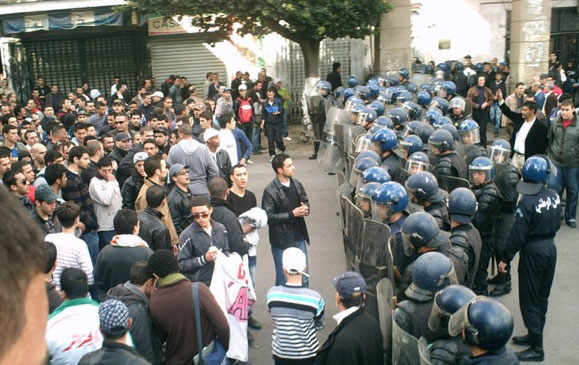- Washington “follows with interest” Morocco’s openness onto Africa (John Kerry)Posted 12 years ago
- The trial of South African Paralympic champion Oscar Pistorius opened in Pretoria on Monday.Posted 12 years ago
- USA welcomes efforts of King Mohammed VI in MaliPosted 12 years ago
- Egypt’s population reaches 94 millionPosted 12 years ago
- Mugabe celebrates his 90thPosted 12 years ago
- Moroccan Monarch to Build a Perinatal Clinic in BamakoPosted 12 years ago
- King Mohammed VI handed a donation of bovine semen for the benefit of Malian breeders.Posted 12 years ago
- Moroccan King’s strategic tour to Africa: Strengthening the will of pan African Solidarity and stimulating the south-south cooperation mechanisms over the continentPosted 13 years ago
- Senior al-Qaida leader killed in AlgeriaPosted 13 years ago
- Libya: The trial of former Prime Minister al-Baghdadi AliPosted 13 years ago
Why social unrest in Algeria loses steam?
 Like Tunisia, Algeria witnessed several self-immolations of unemployed youth. It also faces similar socio-economic conditions to Egypt. However, social riots did not spread throughout the country.
Like Tunisia, Algeria witnessed several self-immolations of unemployed youth. It also faces similar socio-economic conditions to Egypt. However, social riots did not spread throughout the country. Protests failed to gain momentum, as in Tunisia, Egypt, Libya, and, to a large extent, Yemen.
The explanation for this difference lies in Algeria’s oil and gas resources, which gave the regime more resources to address the public’s dissatisfaction, says US Carnegie Middle-East Center.
The Algerian government has allocated more money for food subsidies, increased wages of civil servants, helped young entrepreneurs and promised assistance for poor families. The government also lifted the state of emergency after 19 years.
Economic aid packages, however, are only part of the reason why Algerians have shown little enthusiasm for radical changes in the country. Five other factors also seem to be at play.
First, the public does not share a common set of grievances. Concerns tend to be specific to particular groups: oil workers, public health employees…, while the unemployed protested separately to defend their own cause.
Second, the opposition, trade unions… appear divided and constrained by regulations that restrict the right to demonstrate. And the public do not respond to uprising calls sponsored by political parties knowing that there has never been a real opposition party in the country.
Third, protestors have faced a strong security apparatus. Algeria has expanded its security forces in recent years, from 50,000 police officers in the mid-1990s to about 170,000 officers now. Officers are both well-paid–they earn 65% more than average public civil servant (U.S. $470 compared to U.S. $280 per month)–, making it unlikely they would turn against the government. In Algiers rally, there has been 30,000 policemen for 500 protestors who could reach the protest square.
Fourth, the military in Algeria is more involved into the country’s political sphere than in Tunisia or Egypt. The Algerian army counts approximately 140,000 active members and 100,000 reservists, and has always played a leading role in the country’s affairs. All of Algeria’s presidents have been supported by the army which is also controlling all economic resources and investments.
Fifth, the specter of the civil war in the 1990s is still very fresh in people’s minds. Fears of another cycle of violence keep Algerians from seeking a radical change. The army is threatening the population of a bloodier civil war than before.
The civil war claimed over 120,000 lives, with most families losing at least one member.
These factors do not mean Algeria won’t experience regime change at some point. Algerians abroad are updating their agenda using internet tools to get closer to civil society actors and local political leaders.
